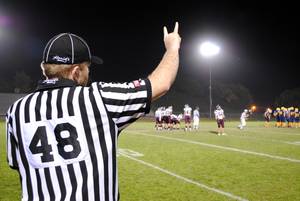The problem with Hawkeye
Interview with
Hawkeye claim that their system is accurate and reliable, but science journalist Nic Fleming warns that definitive calls will always be an impossible goal. Ginny Smith asked him about his point of view.
Nic Fleming warns that definitive calls will always be an impossible goal. Ginny Smith asked him about his point of view.
Ginny - So Nic, Hawkeye seems like quite a good way of preventing arguments in sport. What is it that you think the problem is with the technology?
Nic - It can be used obviously to replace a human referee. However, all I'm really saying is that if we do that, when you screen recreations using Hawkeye, I think there should be something on the screen to acknowledge that it's not a 100% representation of reality that there is a level of uncertainty and there's always going to be some inaccuracy because it is just a re-creation, a measurement. I think it would be very useful for that to be an acknowledgement of that on screen.
Ginny - So, at the moment, we use human referees and that sort of thing and of course, they're not going to be accurate. So, Hawkeye is going to be an improvement on that, so why do we need to point out to people that it's not accurate?
Nic - Well, because as things stand, technology of these kinds are obviously playing a larger and larger role in our lives. I think it's important that we have a mature relationship with some of these technologies. There is a danger that if you watch a Hawkeye replay from tennis for example, when I saw that a couple of years ago, when I was watching those, I would assume that that was an accurate representation of reality and I believe that that's what most people think when in fact, that's not the case. There's always going to be inaccuracy there. I just think that it's important that we use technological tools in an adult way and we understand their limitations and we don't just bow down to them and assume that they are always going to be correct and accurate, that we just acknowledge that there is an uncertainty there.
Ginny - So, how accurate would something have to be for you to accept that it was accurate? So, Hawkeye claim that their tennis system can predict up to 3.6mm which is tiny compared to a tennis ball. Is there really any difference there?
Nic - That's right. Well obviously, I mean, in terms of football, the big controversy was in 2010 and the Frank Lampard goal that must've been close to a meter over the line, looking at the video footage and obviously Hawkeye would've done better than the referee there and would presumably in 19 out of 20 other cases.
But there's a danger as we go forward when we're going to be able to produce footage that looks like real video footage with computers. And for political economic usages, there's a danger that people are going to end up being fooled by some of that footage. So, when we have these representations, I think it's important that we know what is real footage and what isn't. Things are going to become more and more realistic. So, we can all agree that we're going to use the technology and that that could be more accurate than the referee, but let's not pretend that it's 100% accurate.
Ginny - I think the only problem with that is that as humans, we find it quite difficult to understand uncertainty. So, if someone tells you that this is the answer but we're not certain that it's the answer, people will tend to assume that that means that it's wrong. Could that not lead to meaning more arguments?
Nic - Well, I mean, this really leads on to my other point really which is that, in a lot of scientific debates, that are in the public eye, be that sort of nuclear power or genetic modification or climate change, the media is constantly trying to fit science into a yes/no equation. Science isn't about yes/no's it's generally about probabilities. It's scientists saying, "We've got a model and we're 98% sure that this is going to happen." But this is constantly simplified. So, I suppose the other argument is that, if we can be a bit more open and mature in the use of tools like Hawkeye, if we can say, "Look, this is going to be much better than a human referee. However, there is an uncertainty." Perhaps that would help to spread the message amongst lots more people that in science, there is uncertainty and we have to be able to cope with uncertainty. We shouldn't pretend it's not there. That's my concern. We're pretending that uncertainty isn't there. Let's not patronise people in that way. Let's be upfront with people.
Ginny - So, we can kind of use these sports as almost a training ground to help people understand uncertainty in bigger questions as well.
Nic - Absolutely, yeah.
Ginny - And the most important thing when it comes down to it in sport is not actually that the call is correct 100% of the time, but that it's unbiased. So, at least with these electronic judges, they're unlikely to have a leaning one way or another.
Nic - I guess that's the case, yes. But then I mean, there are other people who will oppose these technologies for other reasons. I mean, a lot of the interest in sport is the drama, the controversy, the argument, the discussion, maybe in the pub afterwards. That's another argument that some people make against the use of these sort of technologies.
- Previous How does humour develop?
- Next Hawkeye in sport










Comments
Add a comment